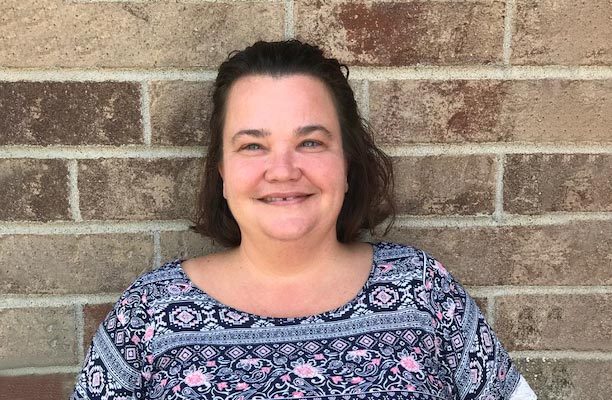
Tracy Steele is a case manager with the state of South Dakota. She works with birth, foster, and adoptive families.
Tracy says that in 10 years of working with families, she’s never woken up in the morning and thought, “I don’t want to go to work today.”
What is your role?
My job is to support birth families who are trying to reunify with their children, work with foster parents who are providing temporary care, and help find permanent families for children who need them.
I tell people that I am 45 years old and have only had two real jobs in my life! This is the second. Before I worked for the state, I was a case manager for older people with disabilities. One day I saw an ad for child protection. I remembered liking the courses in college, so I applied. That was 10 years ago, and now I can’t imagine doing anything else. I truly believe that helping other people become the best they can be is my calling.
A foster parent you work with suggested that we profile you as an Outstanding Caseworker. What do you think set you apart in her mind?
That family has been fostering for as long as I’ve been doing this job. They are amazing people. I should be nominating them as “outstanding parents”! Because foster parents have the hardest job. We may work late nights, but they are tucking kids into bed at night.
I really don’t know why I would stand out in their minds. I work with them the same way I work with all of my foster families—we are a team. I check in with them—a lot. I always make sure to respond to their messages. Often I spend the last half hour or hour of the day returning calls and emails. I take the time to listen to them—really listen—even if it means I am going to be late to my next appointment or for dinner with my family.
I can’t imagine doing anything else. I truly believe that helping other people become the best they can be is my calling. Share on XA lot of your work is with birth parents who are working to regain custody of their children. How do you approach that?
Again, by listening. And by trying to understand what the parents have been through.
I realize that when I meet the parents I am assigned to work with, I am encountering them at the lowest moment in their lives. Because what’s worse than having your kids taken away? I tell them that I know they didn’t ask to be put in the situation they are in. Something happened in their life. I tell them that I’m not here to judge them. I’m here to help them make the changes necessary for them to bring their children home.
Do most of the parents you work with reunify with their children?
Happily, yes. And that is by far the most rewarding part of my job. So many of the parents I work with struggle with addiction—meth is a huge problem in our area. Their families may have tried to help in the past and given up. Then an outsider like me comes along and gives them hope and the tools to make positive changes in their lives. It’s exciting to see people change for the better and think you played a role in making that happen.
Of course, that does not always happen. The hardest part of my job is when I have to tell a child that they cannot return home. I will practice for hours, but there is no easy way to deliver that news.
You spend your days supporting families. Who supports you?
My colleagues, for one! In South Dakota, we are all employed by the state. We’re coworkers no matter what town we work in, so we are one big team. I can email someone across the state who I may not know, but who might have had a similar situation or be able to point me in the right direction.
My coworkers are like my family.
You’ve been doing this for 10 years. What advice would you give someone who is new to the role?
There is so much to learn in this field—about the legal system, about child welfare policies, about people! It takes a year or two to really understand the job. Don’t feel down if you don’t get it right away, and don’t be afraid to ask for help.
Also, take care of yourself. I didn’t do that at first. I fell into the mindset of a workaholic for a while. That’s a pattern that can burn you out and make you feel resentful. Sometimes you need to take a step back and assess the situation: if everybody is safe, almost any problem can be addressed tomorrow.


